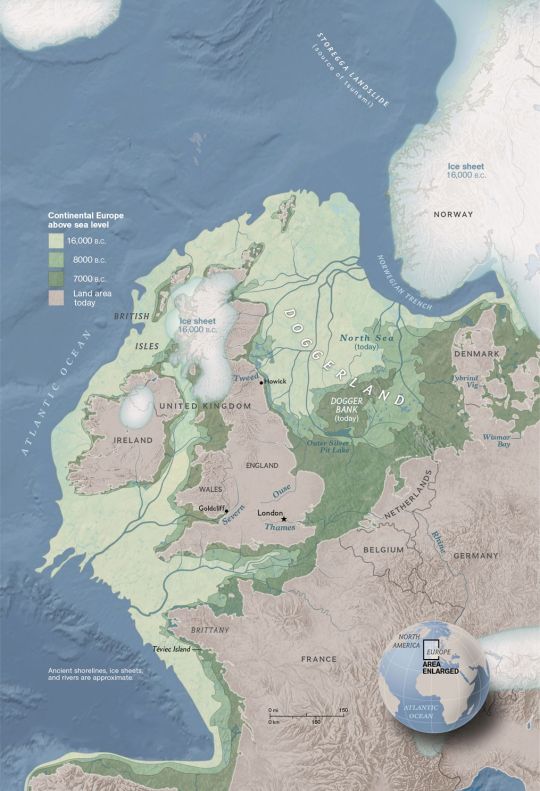#epic of gligamesh
Explore tagged Tumblr posts
Text
There's a lot of stories, myths and tales about lands and kingdoms getting submerged. The British Isles have more than their fair share with a common thread of it being a whole kingdom that it makes me wonder if they are a reminiscent memory of what Doggerland was like, that got twisted and reshaped to the attitudes and thoughts of the generations right after.
Atlantis, albeit more people think of it as being a morality tale, probably has it's roots in the memories and stories passed down of islands disappearing under the sea during the last Ice Age. I think people don't necessarily understand that progress is not a steady line, so the idea that there might have been some advanced civilization hiding out around there isn't entirely a weird concept to swallow, especially if it's remains have been washed away by the floods that occurred at the end of the last ice age.
In addition, a number of the "flood myths" out there don't really seem to be about a flood but a tsunami, in fact a good number of Native American and Inuit myths from the western coast of the US talk about catastrophic tsunamis that followed great earthquakes being responsible for great floods. It wasn't until very recently that scientists started looking at them seriously, as it was believed that the Casacadian seismic zone wasn't capable of strong earthquakes until recent research.
Do you ever think about Doggerland?
Like how fucked up is it that it’s just….. gone.

I tend to forget about it and then when I remember it again I’m like “Oh yeah! There’s like an entire country sized stretch of land that’s just fucking GONE.
well…. “gone”….

#I have strong feelings about submerged lands#because it's such a common reoccuring trope in mythology#it's not just noah's flood or the Epic of Gligamesh it's also stories about trying to make dams against an unending flooding river#there's the story of atlantis and Ys and Lyonesse#British and the isles have a number of different stories about entire kingdoms and lands being submerged#that it makes me wonder if they are a reminiscent memory of Doggerland
59K notes
·
View notes
Text
Legendary Creatures: Scorpion People
Scorpions appear in the mythology of the Sumerians, Akkadians, and Egyptians, generally in benevolent roles, or defensive roles, healing or protective to their followers and deadly to their enemies.

By Till Credner - Own work, http://www.AlltheSky.com, CC BY-SA 3.0, https://commons.wikimedia.org/w/index.php?curid=9296075
Pabilsaĝ 𒀭𒉺𒉈𒊕 was a god, though not much is known about the particular religion. He is a bow-armed warrior, a divine recorder of real estate boundaries, or a judge. It's possible he was linked to healing. He is also linked with the constellation Sagittarius (with a scorpion tail). Ninisina, goddess of the city of Isin and healing, was his wife and his children were Damu, Gumura, and Šumaḫ. He was later thought to be the son of Enlil and Nintur. Many of his associations are through his wife, with him being called 'beloved spouse' that she 'spent time joyously with', that of being the healer and his character, however his being a judge is unique to him. There are some myths that seem to link him to the underworld as an administrator alongside Ningishzida, Hušbišag, and Bidu.

By Drawn by Faucher-Gudin, from an Assyrian intaglio - History of Egypt, Chaldea, Syria, Babylonia and Assyria, Vol. III, Public Domain, https://commons.wikimedia.org/w/index.php?curid=17954496
Scorpion-men (𒄈𒋰𒇽𒍇𒇻 girtablullû) are in several Akkadian myths including the Enûma Elish and the Epic of Gligamesh. They have the head and torso of a man with the legs and tail of a scorpion and appear in art before they appear in literature. In the Enûma Elish, they're created by Tiamat to wage war for the murder of her mate Apsu. By the Epic of Gilamesh, they're the guard of Shamash, the sun god, opening the gates each morning for Shamash to leave by and closing them when he returns at night. Scorpion-women appear in the Epic of Gilgamesh, at the same time Gilgamesh meets the scorpion-men. They can apparently tell that Gilgamesh is two-thirds god, making them particularly perceptive.

By User:MatthiasKabel - Own work, CC BY-SA 3.0, https://commons.wikimedia.org/w/index.php?curid=91518844
Serket is the Egyptian goddess of healing venomous stings and bites. Originally the deification of a scorpion and then became the daughter of either Neith (goddess of warfare and motherhood) and Khnum (god of the Nile cataract and inundation), with Sobek (the crocodile headed god) and Apep (the god of darkness and disorder), whom she protects against and guards when he is caught, as siblings. Since scorpion stings cause paralysis, her name can mean '(she who) tightens the throat' though it can also be read as '(she who) causes the throat to breathe'. She was seen as going after the unrighteous and healing scorpion stings and snakebites. In North Africa, there's a scorpion called the deathstalker that may kill with its sting, so she was a very important goddess, even considered the patron goddess of the pharaohs. She was strongly identified with Isis, eventually becoming merely an aspect of Isis rather than a separate goddess.
5 notes
·
View notes
Text
Thinking of Hinsger/Genoges as ultimate girlboss/malewife
0 notes
Text
Enkidu was the original catboy
4 notes
·
View notes
Conversation
The world's earliest recorded epic: a summary
Everyone between Tigris and Euphrates: Gilgamesh, no.
Gilgamesh: Gligamesh YES!
25 notes
·
View notes
Note
that epic of gligamesh translation is unfortunate. can't get over the weirdly possessive and destructive language, it's a bit disturbing honestly. he reels off a great list of things that his dead love is to him and how that person relates to his own self gratification, and nothing more.
I'm really high right now (cause pot is my pain meds), and I don't think I've mentioned The Epic of Gilgamesh in W E E K S so I am somewhat baffled by this ask.
2 notes
·
View notes
Text
Mesopotamian Context of Genesis: The Genesis Flood Narrative is a Polemic Against Babylon, Not an Appropriation of its Mythos.
It is often claimed that, since the ancient Sumerians and Babylonians have a similar flood story, the Israelites must have stolen their religion from others.
Setting aside the subtle antisemitism of this argument, where the ancient Hebrews are treated as if they are too stupid to form their own culture, this idea can be disabused with logic and with honest examination of the data.
It is true that the Sumerians, and later the Babylonians, have flood stories that parallel the biblical flood narrative. These narratives are within the Babylonian “Epic of Gilgamesh and the Sumerian “Eridu Genesis.” The Sumerian is the oldest written version. That is a key point. It is the oldest WRITTEN (cuneiform) version, but that does not mean it is the oldest source of the story. Oral tradition was, and still is, a widely used method of passing on important information. For all we know, a scribe in Sumer simply wrote a story he heard from the oral traditions of others. I however do not think that is the case. What I think is that the flood happened. Any large enough flooding event would have left a cultural memory in the region, no matter which flood interpretation an individual Christian maintains. The fact that other cultures in the near east know the story actually buttresses the claim of biblical accuracy that we maintain. Additionally, we can see that genesis stands as a polemic against Babylon. The Babylonian claim to fame was that divine beings brought them knowledge. These divine beings were called Apkallu. Marduk, the chief deity of the time (for Babylon) and a deity that didn’t like humanity, became angry and sent a flood. The Apkallu, who later get consigned to the underworld, come up with a plan to preserve the wonderful knowledge they had imparted to man. How? Well, Apkallu before the Babylonian flood were divine, Apkallu after the flood were called 2/3 divine. Gligamesh is an example. They mixed with humankind. In this narrative, the deity that sent thr flood was a big meanie, and the Apkallu who taught the knowledge were the good guys who were trying to care for humanity.
(Is any of this sounding familiar? It should.)
This exactly parallels Enoch, where divine beings come to mankind and teach illicit knowledge, increasing violence and corruption on earth, mixing with humankind, and as a response, God sends a flood. The point here is that Babylon thought they were all that and a bag of chips because they had been given divine knowledge that raised them into a mighty force. A force that was a very real, and present, threat against Israel. What the Babylonians saw as good, was bad for God’s people. It can be argued that it was intended to be bad for them by certain, fallen, beings This is the reason for the flood narrative in the bible, and in Enoch. For the Jews of the time, the actions of the Apkallu (watchers) was a BAD thing. It corrupted mankind. The flood story is in the bible, not to steal content from Sumerians or Babylonians, but to stand as a Polemic against the Babylonian spiritual system.
This information can be found:
- In a paper titled On the Origin of Watchers: A Comparative Study of the Antediluvian Wisdom in Mesopotamian and Jewish Traditions. (2010). By : Amar Annus
- In J.C. Greenfields entry on “Apkallu” in the Dictionary of Deities and Demons in the Bible (1999).
-Compiled in Michael Heiser’s book, Reversing Hermon: Enoch, the Watchers and the Forgotten Mission of Jesus Christ (2017).
12 notes
·
View notes
Text
@paimon heeft gereageerd op je bericht: Someone has a bad temper
are you reading the epic of gligamesh?
Yeah it’s homework for monday and I don’t have much better things to do on the train
1 note
·
View note